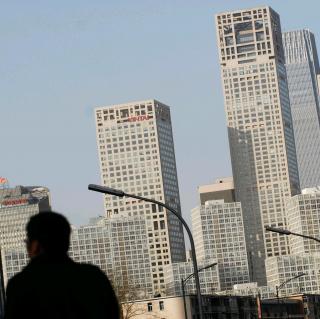
介绍:
China likely to ease sales tax on existing homes: report
The Beijing-based China Securities Journal is reporting that Chinese authorities are likely to relax the sales tax on existing homes.
Under the new policy, sales of a second home purchased no less than two years prior will be exempt from a 5-percent tax on the home's price.
Currently, the taxable period is five years from the date of purchase. The current policy has been in place since early 2011, when the central government adopted a package of policies aimed at curbing the overheated housing market.
The housing market across China has suffered a notable downturn this year, with most major markets experiencing softer sales numbers in recent months.
China's central bank may grant $65 bln loans to banks
China's central bank is reportedly to grant 400 billion yuan worth of loans to commercial banks in a bid to maintain abundant liquidity and support the cooling economy.
That is equivalent to 65 billion US dollars.
Another 200 billion yuan of three-month loans are reported to be granted to five or six listed banks via the Standing Lending Facilities or SLF.
The loan via SLF is the second similar move to bolster liquidity in a month.
Last month, the central bank granted a total of 500 billion yuan worth of loans via SLF to five state-owned commercial banks.
Moody's cuts Russia's rating
Moody's has cut Russia's sovereign debt rating to Baa2 from Baa1, becoming the second rating agency to cut the country's rating this year.
Moody's says low oil prices and Russian borrowers' restricted access to international markets are the main drivers for the downgrade.
The agency adds the prolonged crisis in Ukraine was weighing on Russia's medium-term growth prospects.
Russia's high dependence on the hydrocarbon sector has not decreased, but is likely to limit the economy's growth.
Moody's expects real growth to start declining by the end of this year, and continue falling at least until June of next year.
The S&P initiated a downgrade of the Russian economy in April.
EU opts not to investigate on China's telecom imports
The European Union has decided it won't launch an anti-subsidies investigation on Chinese telecom equipment makers Huawei and ZTE.
The EU was considering launching investigations into imports of telecom equipment made by the firms, claiming the two companies receive unfair subsidies from the Chinese government.
The decision not to launch trade investigations follows an agreement between the EU and China to put a cap of 1 billion euros worth of EU imports from Huawei and ZTE.
Both sides have also agreed to monitor the market share of Chinese telecoms in Europe, as well as European companies operating in China.
For more on the EU decision, CRI's Paul James spoke earlier with Mike Bastin from London, Director of the China Business Centre at Southampton Solent University.
…
Back anchor:
Mike Bastin, Director of the China Business Centre at Southampton Solent University.
Abe hints to delay consumption tax hike
Japanese Prime Minister Shinzo Abe is hinting that he may delay a second consumption tax hike.
Abe made the comment during an interview with the UK's Financial Times, stating that "if the economy derails and if it decelerates, there will be no increase in tax revenues so it would render the whole exercise meaningless."
Without the delay, the tax would have been hiked to 10 percent.
The last hike, earlier this year, was from 5 to 8 percent.
Japan's economy shrunk more than 7 percent in the second quarter following the tax increase.
China's JD.com starts $1bln operations before Double Eleven
China's e-commerce giant JD.com says it has launched its warehouse and logistics initiative, ahead of the country's biggest shopping event, the Double Eleven Shopping Festival.
It will help process orders during the event, which generates a spike in online shopping.
The initiative is part of a 1 billion U.S. dollar push to expand storage and processing facilities in China.
JD.com now operates 7 fulfillment centers and nearly 100 warehouses across the country.
Last year, the company saw 1.6 billion U.S. dollars of sales produced during the one-day event on November 11.
大家还在听

